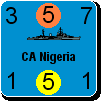qgaliana
Posts: 311
Joined: 4/27/2005
Status: offline

|
(brief thread diversion) I'm not an expert and it's very complex, but read a bit a bout it so I'll take a shot (from a friendly outsider perspective)...
Personal opinion is pride was a good part of it - or at least the attempt to salvage what was left. But different Frenchmen salvaged it in different ways. Some by refusing to stop the fight. Others by accepting defeat with some attempt at dignity. Remember the French army was well and truly cooked - they performed the military equivalent of ducking into an uppercut. The homeland was lost, not just some remote colony, so surrender was not unreasonable. In hindsight we see a more monstrous enemy and a long total war, but that wasn't so obvious then (propaganda aside).
In Europe (all countries) there was no shortage of fascists willing to setup puppet governments. In time the Vichy regime became more and more controlled by them under German pressure. But Vichy France was really only nominally in charge - the different military governors pretty much ruled as independent viceroys. The military men generally hated Germans more than they disliked the English. For the most part, those that hadn't gone Free French were hoping to take another crack at the Germans, but needed some favourable conditions especially since taking up the fight again was technically an act of treason. But politics has to be considered. The big names in charge of North Africa or the Near East were not likely to bow their heads to a junior upstart like de Gaulle. Pride.
Churchill didn't exactly help. The same pride that guaranteed they'd rather die than surrender the fleet to the Germans (which is basically what eventually happened), meant they wouldn't quietly accept an English ultimatum (and I may be wrong but I think the French admiral was an anglophobe). I don't think they believed the English would shoot. But once they had, it pretty much guaranteed a cold reception everywhere else. So: Dakar, Madagascar, Syria, operation Torch; at this last, the allies salvaged this mostly by laying some early political groundwork and keeping the British out of sight. Even then the French felt they needed to put a token resistance to save face. More pride.
But strictly speaking, the French never fired at allied units unless they were being attacked by them. Outside of the influence of German guns (i.e. european France), the most the Germans got out of them was overflight rights for planes going to Iraq. Impossible to oppose without going openly free french.
Still, I oversimplify. France along with the colonial empire was badly fragmented into much worse than just free french vs vichy. The politics of Gaullist vs communist vs Petainist vs militarists vs etc. is worthy of PHD discussions. But I don't understand that part very well, and it's hard to get objective material on political matters.
|
 Printable Version
Printable Version















 . When they started forming the cav-mechanized groups most scources do not identify which cavalry are involved.
. When they started forming the cav-mechanized groups most scources do not identify which cavalry are involved.






 New Messages
New Messages No New Messages
No New Messages Hot Topic w/ New Messages
Hot Topic w/ New Messages Hot Topic w/o New Messages
Hot Topic w/o New Messages Locked w/ New Messages
Locked w/ New Messages Locked w/o New Messages
Locked w/o New Messages Post New Thread
Post New Thread